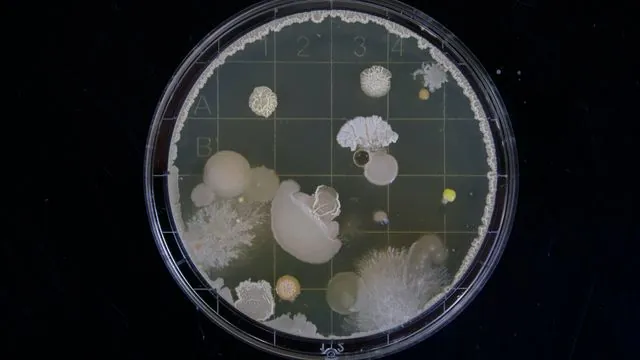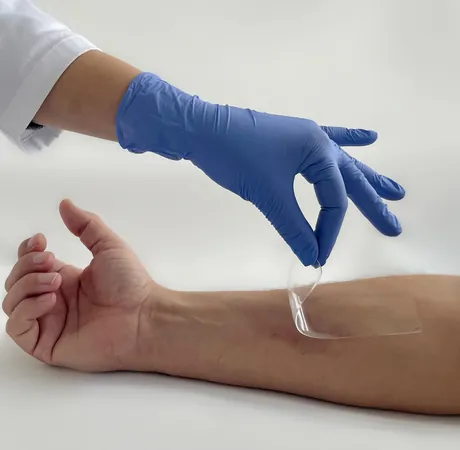
Revolutionary Antibacterial Material Could Make Antibiotics Effective Again Against Superbugs!
2024-11-18
Author: Yu
Groundbreaking Study
In a groundbreaking study from Chalmers University of Technology in Sweden, researchers have revealed that antibiotic-resistant bacteria can regain their susceptibility to treatment when antibiotics are combined with a newly developed antibacterial material infused with peptides. This innovative research has shown a staggering 64-fold increase in the effectiveness of antibiotics when used alongside this material, suggesting a major leap forward in the fight against drug-resistant infections.
The Novel Antibacterial Material
The material, primarily a hydrogel embedded with antibacterial peptides, has been under investigation for years and has demonstrated remarkable efficacy against various bacterial strains, including notorious antibiotic-resistant variants. These peptides, small protein-like molecules, form the backbone of this new treatment method.
Lab Testing and Results
When tested in laboratory settings, the researchers confirmed that the use of this hydrogel, which enhances the performance of standard antibiotics such as oxacillin and vancomycin, significantly boosts the drugs' bactericidal effects. In fact, the combination treatment was able to lower the effective concentration of oxacillin by 64 times against Methicillin-resistant Staphylococcus aureus (MRSA), a strain infamous for its resistance to common antibiotics. This reduction means that the concentration of oxacillin fell below levels at which bacteria typically resist treatment, reviving the antibiotic’s efficacy against such formidable pathogens.
Synergistic Effect
The study also indicated a synergistic effect, with the hydrogel enhancing the antibiotics' effectiveness beyond mere addition. In contrast to traditional peptide solutions that quickly lose their potency in the body, this hydrogel formulation maintains its stability and activity over extended periods, granting a longer window of effectiveness.
Mechanics of the Treatment
Explaining the mechanics behind the treatment, Annija Stepulane, the first author of the study, stated, "The hydrogel interacts closely with the bacteria, weakening their defenses and making them more vulnerable to antibiotic action. Some bacteria that were previously deemed untreatable are showing responsiveness once again."
Clinical Applications
The potential clinical applications for this antibacterial material are vast. With the ability to be locally applied, such as in wound care, healthcare providers can enhance the effectiveness of antibiotics right at the site of infection, which is especially crucial given the unpredictability of bacterial resistance. "In case a wound infection is present, applying this peptide-infused material can increase the chance of antibiotics successfully eliminating the infection," added Martin Andersson, a research leader at Chalmers.
Non-toxic Nature and Future Prospects
Moreover, the non-toxic nature of this material means it is unlikely to cause adverse side effects, posing a promising avenue for incorporating it into standard post-surgical care and other medical settings, especially in regions facing a high burden of antibiotic resistance.
Commercialization Efforts
Looking ahead, the Chalmers team is collaborating with the spin-off company Amferia to commercialize their findings. A wound dressing featuring this hydrogel is set to launch in several European countries aimed at veterinary applications, while an application for human use is under review for the US market.
Implications for Global Health
As resistance rates continue to climb and the effectiveness of antibiotics diminishes, innovations like these offer hope in the prolonged battle against one of modern medicine's critical challenges: antibiotic resistance. The implications of this research could play a pivotal role in global health strategies, potentially preventing thousands of infections worldwide.
Stay Informed
Stay tuned as this story develops, and don’t miss the chance to explore how this cutting-edge research could redefine our approach to treating infections!




 Brasil (PT)
Brasil (PT)
 Canada (EN)
Canada (EN)
 Chile (ES)
Chile (ES)
 España (ES)
España (ES)
 France (FR)
France (FR)
 Hong Kong (EN)
Hong Kong (EN)
 Italia (IT)
Italia (IT)
 日本 (JA)
日本 (JA)
 Magyarország (HU)
Magyarország (HU)
 Norge (NO)
Norge (NO)
 Polska (PL)
Polska (PL)
 Schweiz (DE)
Schweiz (DE)
 Singapore (EN)
Singapore (EN)
 Sverige (SV)
Sverige (SV)
 Suomi (FI)
Suomi (FI)
 Türkiye (TR)
Türkiye (TR)